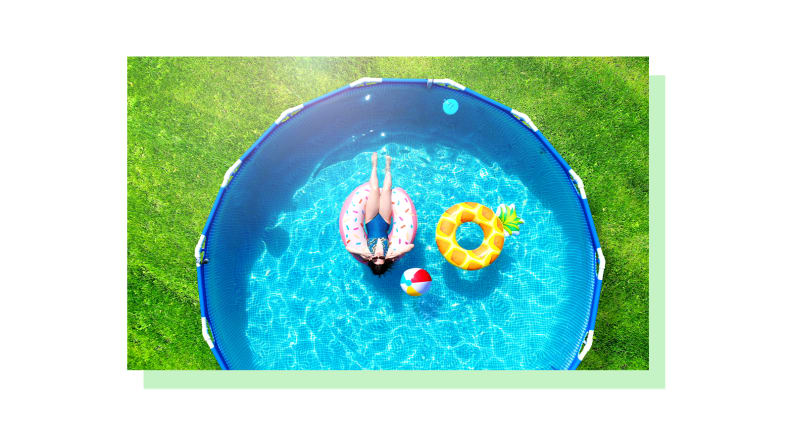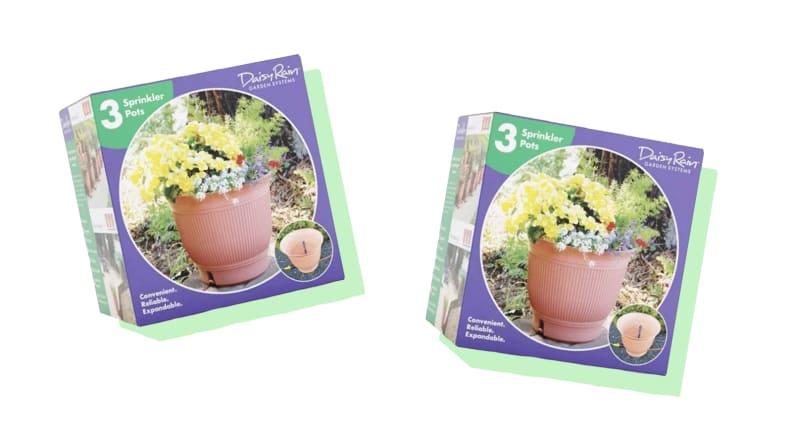Bring your pool from drab to fab with these landscaping ideas
Experts weigh in with design tips for above-ground swimming pools
Products are chosen independently by our editors. Purchases made through our links may earn us a commission.
While your above-ground-pool is a great place to connect with family and friends over the summer, sometimes design elements can feel a little disjointed from the rest of your outdoor landscaping. After all, it’s a big container of water proudly plopped down in the middle of your outdoor living space.
"Above-ground pools run the risk of looking like disconnected objects placed on the landscape, rather than integrated components of a broader design,” says landscape architect Kevin Lenhart, design director at Yardzen. “Planting can help to stitch pools into the overall landscape fabric. Repeating key species from elsewhere in the yard establishes a connection between the pool area and the broader design.”
The question isn’t can you incorporate one into your yard’s "vibe" (spoiler alert: you can), but how. We asked landscape designers for above ground pool landscaping ideas. With their advice, your backyard space will soon be making some waves around the neighborhood.
Create a look that matches the slope of your yard
Ana Maria Torres, landscape designer and founder of Architects, calls above-ground pools a "singular design challenge." Depending on the backyard conditions and pool location, she explains how the challenge and design approach vary.
“If the landscape is almost flat, the high walls that define the container will affect the long views of the space, so the design needs to be approached from another angle to transform the perception of the visual barrier of the pool into an integral part of the house or the rest of the garden,” she explains.
Conversely, if there’s a sloped landscape around the house, the above-ground pool can become the transitional element between the levels.
“In both cases, integrate the pool into the landscape by a combination of strategies. If the size and conditions allow, [you can] transform the surrounding area into a stepping garden, creating multiple levels and using a combination of planting and decking with soft lighting. In that way, the access to the pool can help soften the sense of it being a container.”
Use repeating plants for a cohesive design

Whether it's more desert xeriscaping, a landscape that requires little to no irrigation to thrive, paired with a stock tank pool or softer grasses paired with a Zen-like cedar tub, plants can make a space feel inviting and really define your preferred style, says Lenhart.
To reach your pool potential, you don’t have to look farther than your own backyard for inspiration. For the smoothest transition, he suggests choosing a key species from your yard's planting design and repeat it near your pool to make the area cohesive with the overall design.
“Poolside planting zones have pretty much the same level of flexibility as typical foundation planting areas,” he says, noting that people often choose a tropical theme but that shouldn’t dictate you if you don’t feel the attraction.
Decorate with pretty ornamental grasses, succulents, and fragrant herbs
Both experts list ornamental grasses as favorites for above-ground pools.
“They’re soft, low maintenance, low litter, have long seasons of interest, and look good in a variety of landscape styles,” says Lenhart, while Torres loves them for their low-water needs. “I also like strappy plants with unique upright blooms like Kangaroo Paw or Red Yucca. These are striking, handle poolside conditions well, and can be planted alone or in tidy rows. Low, soft succulents like Echeveria and Aeonium are a solid choice for desert-centric designs,” he continues.
Torres adds plant basil, citronella-scented geraniums, and other bug-repelling plants as great options, as well as lavender and wildflowers.
Use planters and pots as design elements

Daisy Rain Garden Systems Self Watering Sprinkler Pot Kit.
While plants can be used to screen the above-ground pool walls, Lenhart suggests positioning them at least 18 inches away to minimize the risk of root damage to pool walls. Torres prefers going up to even four feet away from the pool depending on the root systems of your plantings.
To soften the corners and cultivate a beachy, eclectic look (as well as keeping any and all root damage at bay), consider using clusters of potted plants at different heights.
“It’s a matter of how and where they’re placed within the overall scale, design concept, color palette, and the dimension of the space to create a balanced environment,” says Torres. “The important thing is for every element to complement all the others instead of competing for attention.”
- Get the Kante Lightweight Concrete Modern Outdoor Round Planter (Slate Gray) on Amazon for $35
- Get the Daisy Rain Garden Systems Self Watering Sprinkler Pot Kit (three-pack) on Amazon for $149
- Get the Allen + Roth Large Rust Resin Planter with Drainage Holes at Lowe's for $30
Hardscape with stones and concrete
Hardscaping is also an aspect of above-ground pool visuals. In the case of stones or concrete, Lenhart says to design the area around the pool with bare feet in mind.
“Prioritize materials that are slip-resistant and will keep cool,” he says, adding that precast pavers, stone paving, and concrete with a textured finish all work well. He also recommends a barefoot-friendly path from your above-ground pool to your house, or outdoor shower if you have one. “That way, you can hop out without needing to grab a pair of shoes.”
The most traditional stone choices are granite, limestone, and pea rock. White stone definitely expresses a beachy vibe, with a bit of a vintage feel to it. “Crushed stone does have a practical purpose around the immediate base of above-ground pool walls, helping to keep roots and plant material from directly contacting pool walls, where the moisture they carry could lead to rust,” he continues.
Torres warns against bluestone or crushed shells, which aren’t not as easy on bare feet.
Above-ground pool landscaping ideas to avoid
Lenhart advises against incorporating bark mulch into your above-ground pool landscaping because it “can harbor insects that may damage pool walls, and to omit trees or woody shrubs with high root damage potential.”
Torres agrees about checking the root system before selecting and planting trees and shrubs. “Some roots go deep vertically, but others are more superficial and run horizontally, and that can create an issue over time,” she says. “It doesn’t necessarily mean they will puncture the liner, but you will feel the bumps.”
Although a pop of color from an azalea might seem like a good idea, Lenhart warns against it. “Stick to plants with minimal litter or leaf drop,” he says. Constant leaf drop will necessitate constant cleaning and, if you get behind, will dirty your pool and possibly clog its equipment.
Whether they belong to you or someone else, kids will inevitably make an appearance at the pool. To plan for this, Lenhart suggests going kid-friendly by avoiding sharp plants like cactus or toxic plants such as Angel’s Trumpet (a popular tropical beauty with a poisonous punch). Your plants also run the risk of being beat up by splashes and errant pool toys. “Opt for sturdy species that can handle these risk factors,” he continues. “Plants near pools should tolerate splashes of chlorinated water and elevated humidity levels.”
The product experts at Reviewed have all your shopping needs covered. Follow Reviewed on Facebook, Twitter, Instagram, TikTok, or Flipboard for the latest deals, product reviews, and more.
Prices were accurate at the time this article was published but may change over time.


